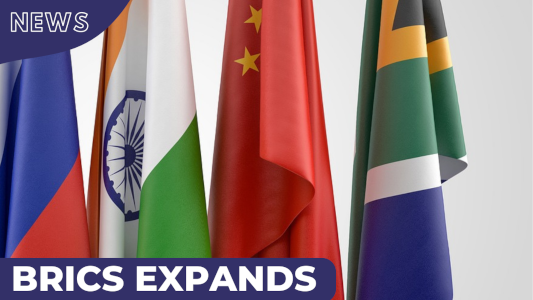
BRICS Expands to Include 6 New Members
August 24, 2023
Tweet
category: Business
The BRICS group of countries, which are Brazil, Russia, India, China, and South Africa, have invited six new countries to join: Argentina, Egypt, Iran, Ethiopia, Saudi Arabia, and the United Arab Emirates.
These countries will become full members of BRICS on January 1st, 2024.
This expansion of BRICS is seen as a historic moment that will allow developing countries to work together more effectively. The leaders of BRICS have pledged to champion the cause of the Global South, which is a term used to describe developing countries in Africa, Asia, and Latin America.
In other news, Indian Prime Minister Narendra Modi met with Chinese President Xi Jinping on the sidelines of the BRICS summit. The two leaders agreed to direct their officials to expedite the de-escalation process of the ongoing conflict between their two countries.
These developments within BRICS are certainly worth paying attention to, as they could have significant implications for global politics and economics.
The implications of the BRICS expansion
The implications of the BRICS expansion on the world economy are still being debated by economists. However, there are a number of potential impacts that have been identified.
One potential impact is that the expansion of BRICS could lead to a more multipolar world economy. This is because BRICS countries are collectively much larger than the traditional Western economies, such as the United States, the European Union, and Japan. As a result, the expansion of BRICS could give these countries more bargaining power in international trade and finance.
Another potential impact is that the expansion of BRICS could lead to increased cooperation between developing countries. This is because the new members of BRICS are all developing countries, and they share many of the same challenges. By working together, these countries could pool their resources and expertise to address these challenges more effectively.
The expansion of BRICS could also lead to increased competition for resources and markets. This is because the new members of BRICS are all large and growing economies. As a result, they will be competing with each other for access to resources, such as oil and gas, and for markets, such as China and India.
Overall, the implications of the BRICS expansion on the world economy are still uncertain. However, it is clear that this expansion could have a significant impact on the global balance of power.
In addition to the above, here are some other potential implications of the BRICS expansion on the world economy:
- Increased investment in infrastructure and development projects in developing countries.
- Increased trade and economic cooperation between BRICS countries and other developing countries.
- A more diversified global economy, with less reliance on the traditional Western economies.
- A more stable global economy, as BRICS countries have a strong commitment to economic growth and development.
Of course, the actual impact of the BRICS expansion on the world economy will depend on a number of factors, such as the policies of the new members and the global economic environment. However, the expansion of BRICS is a significant event that is likely to have a major impact on the global economy in the years to come.
Impact on the Petro Dollar
The BRICS (Brazil, Russia, India, China, and South Africa) alliance has the potential to influence the dominance of the US dollar as the global reserve currency, often referred to as the "petrodollar." While the direct impact on the petrodollar system is complex and multifaceted, the BRICS countries collectively could contribute to the diversification of international trade and financial transactions, which could indirectly challenge the petrodollar's supremacy. Here's how BRICS could potentially impact the petrodollar:
1. **Alternative Trade Settlements:** BRICS nations have expressed interest in conducting trade using their own currencies, bypassing the need for US dollars in international transactions. By promoting direct currency exchanges, these countries can reduce their reliance on the US dollar for trade settlement. This could encourage other nations to explore similar arrangements, gradually diminishing the dollar's dominance.
2. **New Reserve Currency Arrangements:** If BRICS were to establish their own alternative reserve currency or a basket of currencies for their mutual trade, it could reduce the need for countries to hold excessive US dollar reserves. This could gradually lessen the dollar's role as the primary global reserve currency.
3. **Development of Financial Institutions:** The BRICS alliance has created institutions like the New Development Bank (NDB) to provide funding for infrastructure projects and development initiatives. If these institutions gain prominence and offer attractive lending terms to member countries and beyond, it could reduce dependence on traditional financial institutions often associated with the petrodollar system.
4. **Commodity Markets:** Some BRICS countries, particularly Russia and China, have been exploring alternatives to the US dollar for pricing and trading commodities, including oil. If these efforts gain traction, it could gradually erode the petrodollar's influence on global commodity markets.
5. **Bilateral Agreements:** BRICS countries might negotiate bilateral agreements with oil-producing nations to trade oil in their own currencies or other alternatives. If a significant number of such agreements are established, it could lead to decreased demand for US dollars for oil transactions.
6. **Market Confidence:** If BRICS nations can demonstrate economic stability and growth, their currencies could gain credibility and attract international investors. This could contribute to the perception that alternatives to the US dollar are viable for global transactions.
7. **Economic Influence:** The combined economic strength of the BRICS nations can shape international economic policies. If they coordinate efforts to promote their currencies and challenge the dominance of the US dollar, it could lead to shifts in the global financial landscape.
It's important to note that while BRICS may challenge the petrodollar's influence, the US dollar's entrenched status as the world's primary reserve currency is not easily replaced. Transitioning to an alternative system would require time, stability, and cooperation among numerous nations and financial institutions. Additionally, global economic and geopolitical dynamics play a significant role in shaping these changes.
While the direct impact of BRICS on the petrodollar may be gradual and subject to various challenges, the alliance's efforts to diversify trade, establish new financial institutions, and promote alternative currency arrangements could contribute to reshaping the international monetary landscape over the long term.
Key Takeaways:
- BRICS has expanded to include six new members.
- This expansion is seen as a historic moment that will allow developing countries to work together more effectively.
- The leaders of BRICS have pledged to champion the cause of the Global South.
- Indian Prime Minister Narendra Modi met with Chinese President Xi Jinping and agreed to expedite the de-escalation process of the ongoing conflict between their two countries.






